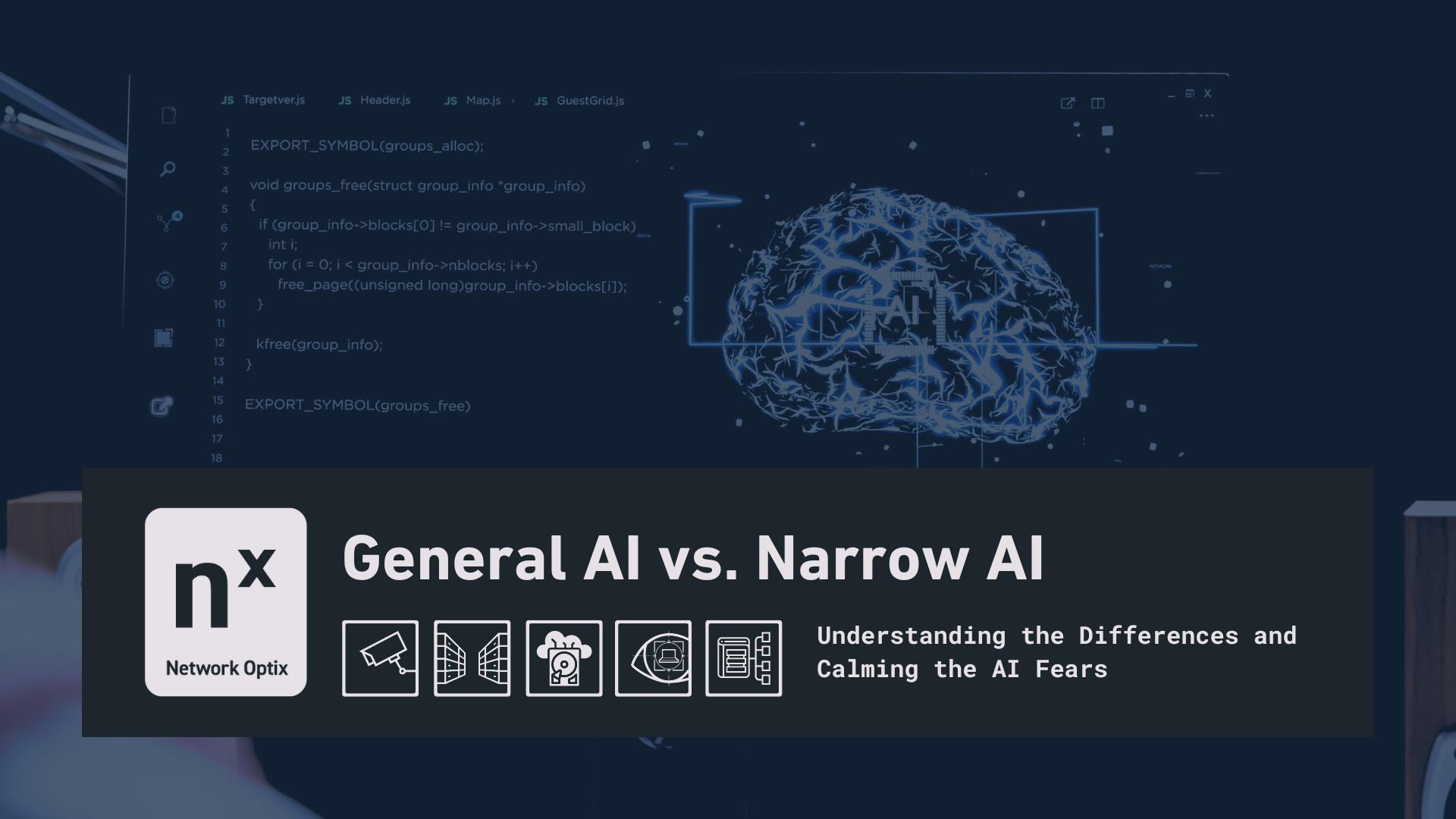Artificial Intelligence has become somewhat of an inflated topic, inciting a mix of both fascination and fear. Fueled by portrayals in movies and books as an all-powerful, sentient force, it's no wonder many people feel apprehensive about its development. However, such portrayals can be misleading, as AI exists in two distinct forms: General AI and Narrow AI. General AI, often seen in science fiction, remains largely theoretical, while Narrow AI is the practical and prevalent technology we encounter today. Most of the AI we interact with, including the AI integrated with Nx products, fall squarely into the category of Narrow AI - designed for specific tasks and far more common and approachable.
General AI vs. Narrow AI: What’s the Difference?
General AI refers to a type of AI that can understand, learn, and apply knowledge across a wide range of tasks at a level comparable to human intelligence - the kind you’re most likely familiar with from pop culture. This type of AI is capable of adapting to new and varied situations without human intervention. Think of it as an AI that can go from playing chess to driving a car, writing poetry, or diagnosing illnesses, all without any reprogramming. As it currently stands, General AI is more of a theoretical concept and a subject of extensive research and debate, rather than a practical reality.
Narrow AI, on the other hand, is designed to perform specific tasks within a limited and predetermined scope. It excels in particular areas by processing vast amounts of data to recognize patterns and make decisions exclusive to its design. In fact, you’ve likely been using it in your daily life for years without realizing it. For example, Narrow AI powers virtual assistants such as Siri and Alexa, recommendation algorithms for streaming services, and even computer vision applications used in Snapchat filters. This form of AI has been in use for years and operates solely within its specified design.
Why Narrow AI is Beneficial
- Specialization: Narrow AI excels at specific tasks, offering high accuracy and performance in areas like surveillance, analytics, and automation.
- Safety: With a defined scope of operation, Narrow AI can only be used for its specific task and cannot “branch out” as we often see in movies.
- Efficiency: Tailored to particular needs, Narrow AI solutions can be optimized for maximum efficiency and effectiveness.
- Practicality: Narrow AI is already integrated into our daily lives, making tasks easier and more efficient. Its focused capabilities make it a practical tool for various industries and individuals.
Network Optix and Narrow AI
At Network Optix, nearly all the AI models configured and integrated with Nx products are Narrow AI. These specialized solutions are designed to address specific challenges and provide precise functionalities tailored to the user's needs and the use case. A few examples of how Narrow AI is utilized in our products include:
- Nx Witness enhances video surveillance with integrated analytics, such as object detection, and advanced video management capabilities like Smart Motion Search. For example, users can quickly locate specific events or objects in their video archives, such as identifying when a person has entered a designated area or locating a specific face in a crowd. This AI is programmed to detect different types of objects and send alerts based on them.
- Nx EVOS leverages various AI plugins to improve operational efficiency and safety across different industries. Examples of applications include monitoring industrial equipment to predict maintenance needs, ensuring construction site safety by detecting hazardous conditions, and optimizing traffic flow in smart cities. Each of these tasks is predesigned and operates within it defined scope.
These applications of Narrow AI demonstrate how the technology can be used to solve practical problems, increase productivity, and enhance safety without intruding on privacy or raising Orwellian-level concerns.
Conclusion
Network Optix is committed to promoting the safe and responsible use of AI. Our solutions leverage the power of video and AI (see Brief Overview of Computer Vision) to gather and manage actionable data, helping users make informed decisions, improve operational efficiency, and enhance the safety and security their operations.
Understanding the distinction between General AI and Narrow AI can help alleviate concerns about the potential risks associated with AI technologies. By embracing Narrow AI, we can all benefit from these incredible advancements in technology while maintaining control, privacy, and the safety of those involved.


